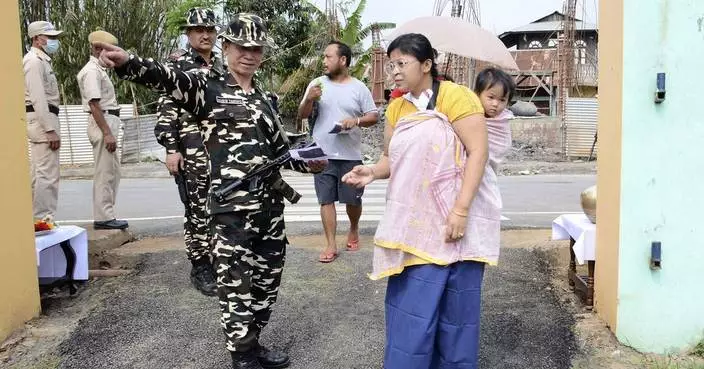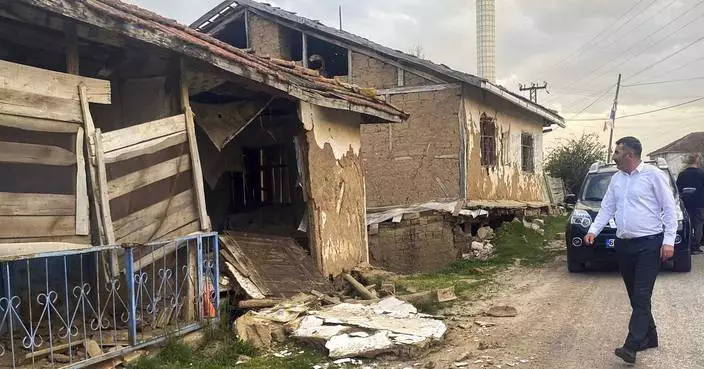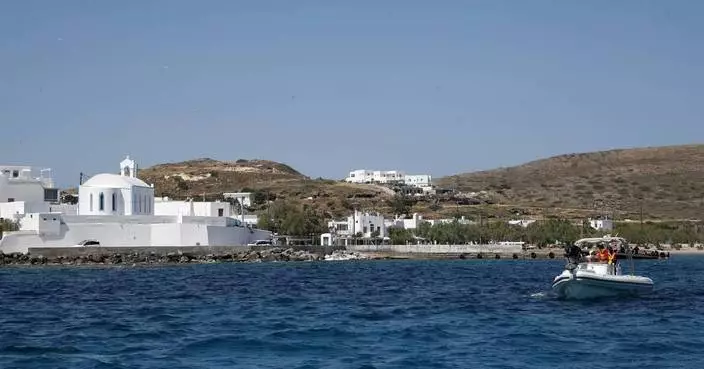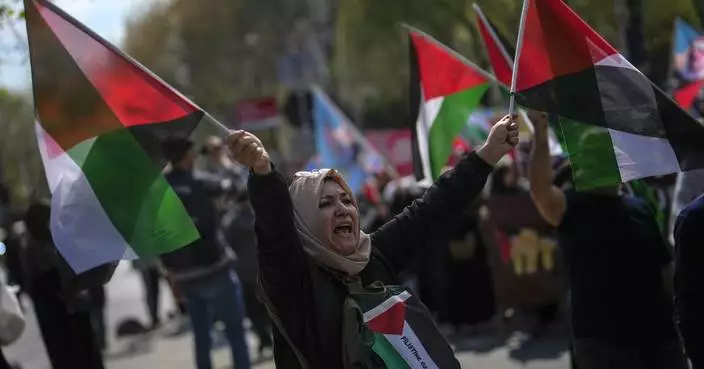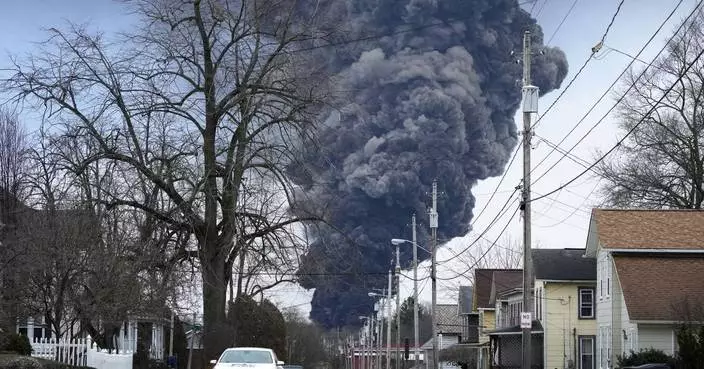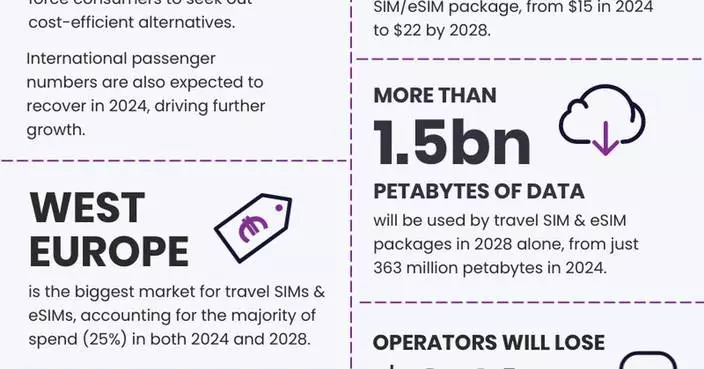U.S. and Turkish officials met on Friday to discuss impending American sanctions on Iran — an issue that has the potential to cause a new flashpoint in relations between the two NATO allies.
U.S. Assistant Secretary for Terrorist Financing Marshall Billingslea, who met with Turkish treasury and foreign ministry officials, said his talks in Ankara were very "positive" and that there was "no hostility" on either side. He also met with a series of Turkish companies.
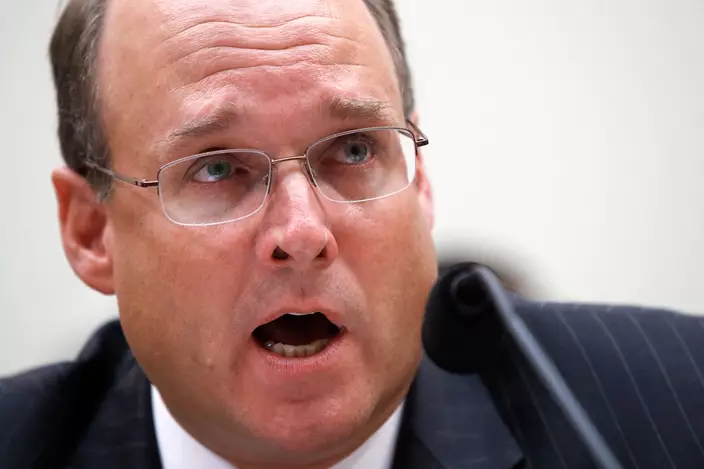
In this Tuesday, Sept. 12, 2017, file photo, Assistant Secretary of the Treasury for Terrorism and Financial Intelligence Marshall Billingslea testifies during a House Foreign Affairs Committee hearing on North Korea sanctions, on Capitol Hill in Washington. U.S. and Turkish officials met on Friday, July 20, 2018. (AP Photo/Jacquelyn Martin, file)
Turkey's foreign ministry said for its part, that it was monitoring the sanctions and that authorities were working to ensure that Turkey is not "negatively impacted by the upcoming sanctions."
President Donald Trump announced in May that he would pull the United States out of a 2015 agreement over Iran's nuclear program and would re-impose sanctions on Tehran. His administration threatened countries with sanctions if they don't cut off Iranian oil imports by early November.
Turkey, which imports a more than half of its oil supplies from neighboring Iran, had earlier suggested that it did not intend to cut off trade with Iran, saying it was not obliged to abide by "unilateral" U.S. decisions.
U.S. Treasury officials have reportedly said in Washington that the U.S. may consider providing waivers from the sanctions to some countries which require time to cut oil imports from Iran.
Speaking to a small group of reporters in Ankara, Billingslea would not say, however, if Turkey would be granted exemptions.
"At this point, I'm not in a position to suggest that we are issuing waivers or exemptions," he said.
At the same time, Billingslea said that the U.S. was adamant about enforcing the new sanctions more "actively."
In May, a U.S. court convicted a Turkish banker from state-run Halkbank for his role in helping Iran evade U.S. economic sanctions. The key witness was Iranian-Turkish gold trader Reza Zarrab, who testified how he orchestrated the scheme and paid bribes to top Turkish officials. The bank said it was working closely with the U.S. Treasury Department and hoped not to incur damages, but the case has strained Turkish-American relations.
"This time around, the treasury sanctions will be enforced very, very aggressively and very comprehensibly," Billingslea said. "I think the Turkish government understands our position on that."
"We certainly would be very, very concerned about trying to trade with Iran in gold," Billingslea said, adding that the U.S. was tracking and trying to understand "large purchases of gold in Turkey."
Turkey, in its statement, said Iran was an "important neighbor" for "economic and commercial relations, as well as our energy imports."
According to data from the country's Energy Market Regulator, Turkey imported 3 million tons of crude oil from Iran in the first four months of 2018, making up 55 percent of crude supplies and 27 percent of its total energy imports.
Billingslea said: "Iran may be a neighbor of Turkey but they are not a friend or an ally."
BAGHDAD (AP) — Turkish President Recep Tayyip Erdog an arrived in Iraq on Monday for his first official visit in more than a decade as Ankara seeks greater cooperation from Baghdad in its fight against a Kurdish militant group that has a foothold in Iraq.
Other issues also loom large between the two countries, including water supply and exports of oil and gas from northern Iraq to Turkey, halted for more than a year.
Erdogan, whose last visit to Baghdad was in 2011, when he was prime minister, met with Iraqi President Abdul Latif Rashid and Prime Minister Mohammed Shia al-Sudani as they inked agreements on water management, security, energy and economic cooperation.
“I believe that my visit and the agreements just signed will constitute a new turning point in Turkey-Iraq relations,” Erdogan said in a joint news conference with al-Sudani.
Al-Sudani said they discussed “bilateral security coordination, which will meet the needs of both parties and confront the challenges posed by the presence of armed elements that may cooperate with terrorism and violate the security of the two countries.”
Erdogan's visit “comes at a sensitive and dangerous time," al-Sudani added, citing Israel's war against the Hamas militant group in Gaza — a war that has had ripple effects across the region.
Erdogan said the leaders had “consulted on the joint steps we can take against the PKK terrorist organization and its extensions, which target Turkey from Iraqi territory," referring to the Kurdistan Workers’ Party, or PKK, a Kurdish separatist movement banned in Turkey.
The PKK has maintained bases in northern Iraq's semiautonomous Kurdish region.
Erdogan had previously announced a major operation against the PKK during the summer, with the aim of “permanently” eradicating the threat it poses. He did not specify what actions Turkish forces would take in Iraq but Turkish forces have in the past carried out numerous ground offensives against PKK in northern Iraq and Turkish jets frequently target suspected PKK sites.
Ankara now aims to create a 30-40 kilometer (19-25 mile) deep security corridor along the joint border with Iraq, Turkish Defense Minister Yasar Guler told journalists last month.
The insurgency — the PKK is fighting for an autonomous Kurdish state in southeast Turkey — has claimed tens of thousands of lives since the 1980s and Turkey and its Western allies have labelled PKK a terrorist organization.
Baghdad has long complained that Turkish actions in Iraq against the PKK violate its sovereignty, but appears to be acquiescing with Ankara’s operations.
In March, after a meeting between the Iraqi and Turkish foreign ministers, Baghdad announced that the Iraqi National Security Council had issued a ban on the PKK, although it stopped short of designating it as a terrorist organization. Erdogan on Monday praised the ban.
Al-Sudani told journalists during a visit to Washington last week that Iraq and Turkey have “true interests with one another and common projects.” He noted that the PKK has long had a presence in northern Iraq, “but we are not allowing any armed group to be on Iraqi territory and using it as a launchpad for attacks.”
Ankara has argued that PKK's presence in Iraq threatens the planned construction of a major trade route, the Iraq Development Road, that would connect the port in Basra, southern Iraq, to Turkey and Europe through a network of rail lines and highways.
Baghdad may take a similar approach to the PKK as it has taken to Iranian Kurdish dissident groups based in northern Iraq.
The presence of Iranian dissidents had become a point of tension with Tehran, which periodically launches airstrikes on their bases in Iraq. Last summer, Iran and Iraq reached an agreement to disarm the groups and relocate their members from military bases to displacement camps.
Energy issues and water rights are also key in Iraq-Turkey ties.
An oil pipeline running from the semiautonomous Kurdish region to Turkey has been shut down since March 2023, after an arbitration court ruling ordered Ankara to pay Iraq $1.5 billion for oil exports that bypassed Iraq's central government in Baghdad. The sharing of oil and gas revenues has long been a contentious issue between Baghdad and Kurdish authorities in Irbil.
In recent years, Iraqi officials have complained that dams built by Turkey are reducing Iraq’s water supply.
The Tigris and Euphrates rivers, which provide most of Iraq’s fresh water, originate in Turkey. Experts fear that climate change is likely to exacerbate existing water shortages in Iraq, with potentially devastating consequences.
Mustafa Hassan, a Baghdad resident, said he hopes that Erdogan’s visit “will help to solve problems related to water, because Iraq is suffering from a water scarcity crisis, and this affects agriculture.”
Erdogan said Ankara was aware of the water problems Iraq faces and that the two countries have set up "a joint permanent committee which is going to help through cooperation ... taking our shared interests into consideration.”
Fraser reported from Istanbul. Associated Press writers Andrew Wilks in Istanbul, Ellen Knickmeyer in Washington and Ali Jabar in Baghdad contributed to this report.

FILE - Turkey's President Recep Tayyip Erdogan, right, and Iraq's Prime Minister Mohammed Shia al-Sudani speak to the media after their talks, in Ankara, Turkey, Tuesday, March 21, 2023. Erdogan was set to make his first official visit to Iraq in more than a decade on Monday April 22, 2024 as his country seeks greater cooperation from Baghdad in its fight against a Kurdish militant group that has a foothold in northern Iraq. (AP Photo/Burhan Ozbilici, File)
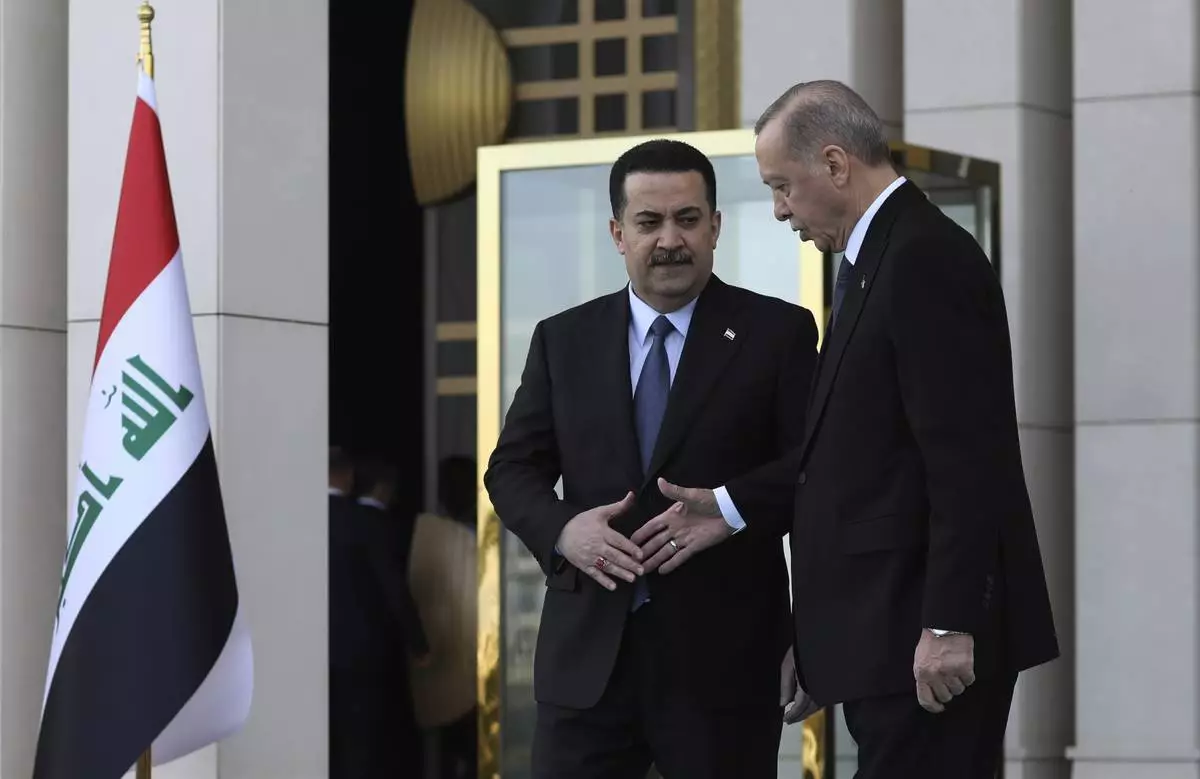
FILE - Turkey's President Recep Tayyip Erdogan, right, and Iraq's Prime Minister Mohammed Shia al-Sudani shake hands during a welcome ceremony in Ankara, Turkey, Tuesday, March 21, 2023. Erdogan was set to make his first official visit to Iraq in more than a decade on Monday April 22, 2024 as his country seeks greater cooperation from Baghdad in its fight against a Kurdish militant group that has a foothold in northern Iraq. (AP Photo/Burhan Ozbilici, File)






